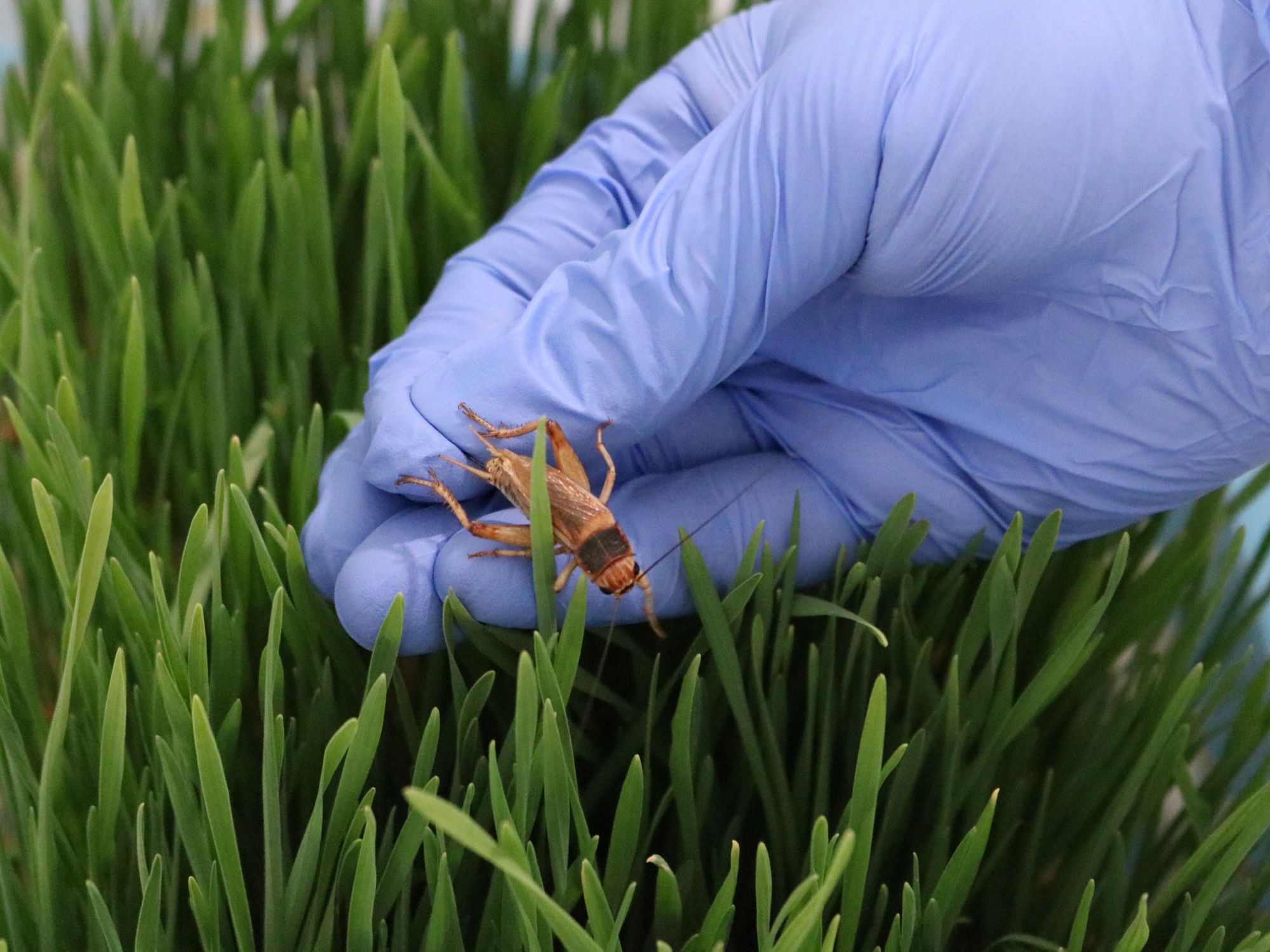Production of Crickets
Adult crickets (Acheta domesticus) on wheatgrass
Photo: N. Schwab, ATB
Edible insects represent a significant part of the diet of many humans worldwide, for example in several countries of Africa, South America, Asia and Oceania. However, only a small number of insect species are reared on a large scale for food and feed. Europe is emerging as the fastest growing market for edible insects, with projected sales of over 1 billion Euros by 2022. The demand for Orthoptera (the order of insects that comprises, among others, grasshoppers and crickets) is expected to grow even faster due to the high demand for cricket-based products such as protein powder, cereal bars, crackers or biscuits. According to European regulations and standards, insects are to be considered as livestock. Therefore, the Good Agricultural Practices (GAP), currently in force for other types of animal husbandry, should be applied. However, due to the specificities of insect rearing, these concepts need to be revised and adapted. As potentially successful solutions to the challenge of producing edible insects often are a matter of empirical estimations, fundamental research is needed to develop facilities, procedures, and techniques used to rear insects economically efficient.
Therefore, this project aims at optimizing the rearing conditions of crickets (Acheta domesticus) as an alternative food source in lab-scale production systems pursuing the development of sustainable insect rearing processes.
The way of achieving ideal rearing conditions represents a key challenge in order to induce optimal development and low mortality of the crickets. Abiotic factors (e. g. temperature, humidity, hours of light per day, light intensity, wavelength) directly affect the life cycle of crickets. Hence, the aim of the project is to optimize already known parameters and to identify additional potential influencing factors on the rearing and resulting chararacteristics of the crickets produced on a laboratory scale.
Consequently, the project identifies and optimizes abiotic parameters increasing the final yield of A. domesticus reared in a lab-scale system. Therefore, specifically designed containers are set up in climate chambers in a controlled environment. In several rearing cycles, combinations of abiotic factors and technological treatments - including the application of LED and UV light - are tested for synchronizing mating and hatching of the animals. Reducing the human-insect-interactions required to separate earlier and later instar by synchronized life cycles, decreases the induced stress by human intervention, and, in turn, reducing mortality in artificial rearing systems.
For designing and producing modular rearing boxes for urban insect cultivation, innovative polymer-based composite materials will be tested and selected, taking into account specific demands for the bio-economic rearing of crickets in pilot-scale.
As a complementary measure, effects on quality, nutritional aspects of the crickets produced and microbial aspects regarding the proper hygienic design of the rearing boxes will be investigated to identify most promising combinations of rearing parameters for a bioeconomic production of high-quality, highly nutritious and safe cricket-based food products.
Text: S. Bußler, ATB
Contact
Leibniz Institute for Agricultural Engineering and Bioeconomy (ATB)
Max-Eyth-Allee 100
14469 Potsdam
Germany
Website
www.atb-potsdam.de
Project duration
March 2019 - February 2024
Interaction with f4f and associated partners
HUB, IRI THESys, IGZ, pmp, PYCO
InnoMat GmbH, Osram Opto Semiconductors GmbH

Oliver Schlüter is coordinator of the research programme "Quality and Safety of Food and Feed" and head of the working group "Emerging Food Resources and Technology" of the ATB. In his research work Dr. Schlüter focuses on the development of innovative technologies in the primary production of food (fruit, vegetables, herbs, spices, meat, edible insects), the processing of fresh produce (high pressure, plasma, etc.) and the non-destructive monitoring of quality and safety aspects (fluorescence image analysis, flow cytometry, etc.).

Marios Psarianos studied chemical engineering at the National Technical University of Athens and carried out his diploma thesis under the supervision of Prof. Petros Taoukis on the valorization of olive oil by-products by applying high pressure and pulsed electric fields for recovery of high added value ingredients. As a PhD student at ATB, his main focus is on the production of edible insects and isolation of food ingredients (proteins, fat, vitamins, chitin) thereof.
Psarianos M, Ojha S, Schlüter OK. (2023). Evaluating an emerging technology based biorefinery for edible house crickets. (Frontiers in Nutrition)
doi:10.3389/fnut.2023.1185612
Psarianos M., Ojha S., Schneider R., Schlüter O.K. (2022) Chitin Isolation and Chitosan Production from House Crickets (Acheta domesticus) by Environmentally Friendly Methods. (Molecules)
doi:10.3390/molecules27155005
Fricke A., Psarianos M., Sabban J., Fitzner M., Reipsch R., Schlüter O.K., Dreyer C., Vogt J.H-M., Schreiner M. and Baldermann S. (2022) "Composite materials for innovative urban farming of alternative food sources (macroalgae and crickets). (Front. Sustain. Food Syst.)
doi:10.3389/fsufs.2022.1001769
Psarianos M., Fricke A., Ojha S., Baldermann S., Schreiner M., Schlüter O.K. (2022) Effect of Narrowband UV-B Irradiation on the Growth Performance of House Crickets (Foods)
doi.org:10.3390/foods11213487
Psarianos, M., Dimopoulos, G., Ojha, S., Cavini, A. C. M., Bußler, S., Taoukis, P., & Schlüter, O. K. (2022). Effect of pulsed electric fields on cricket (Acheta domesticus) flour: Extraction yield (protein, fat and chitin) and techno-functional properties. Innovative Food Science & Emerging Technologies, 76, 102908.
doi:10.1016/j.ifset.2021.102908
Ojha S., Bekhit A.E.-D., Grune T., Schlüter O. K. (2021) Bioavailability of nutrients from edible insects, Current Opinion in Food Science, Vol. 41, 2021, 240-248,
doi: 10.1016/j.cofs.2021.08.003
Ojha, S.; Bußler, S.; Psarianos, M., Rossi, G., Schlüter, O. K. (2021) Edible Insect Processing Pathways and Implementation of Emerging Technologies. Journal of Insects as Food and Feed, 7(5), 877-900.
doi.org/10.3920/JIFF2020.0121
Fröhling, A.; Bußler, S.; Durek, J.; Schlüter, O.K. (2020) Thermal impact on the culturable microbial diversity along the processing chain of flour from crickets (Acheta domesticus). Frontiers in Microbiology.
doi:10.3389/fmicb.2020.00884
Ojha, S.; Bußler, S.; Schlüter, O. K. (2020) Food waste valorisation and circular economy concepts in insect production and processing. Waste Management.
doi:10.1016/j.wasman.2020.09.010
